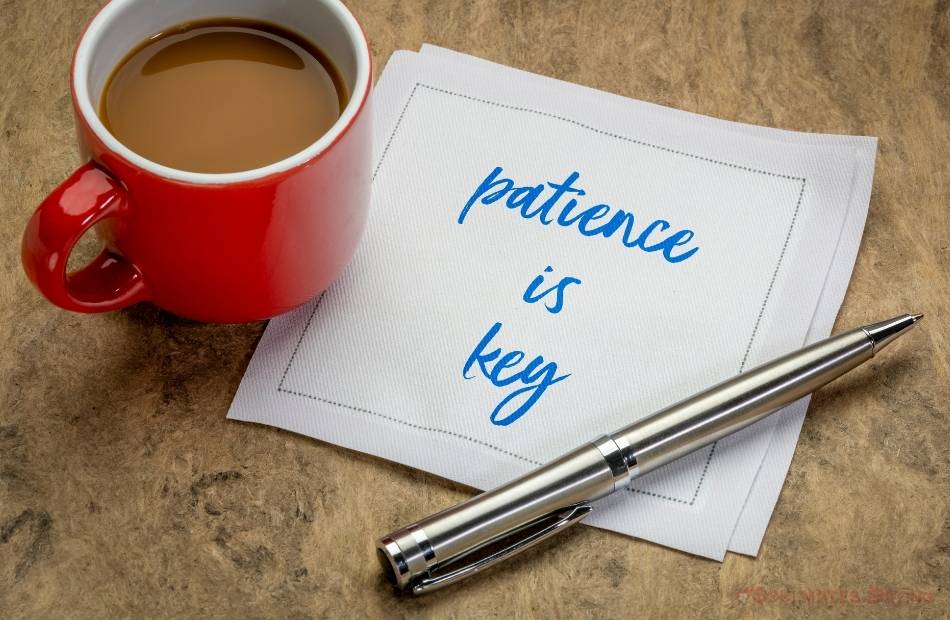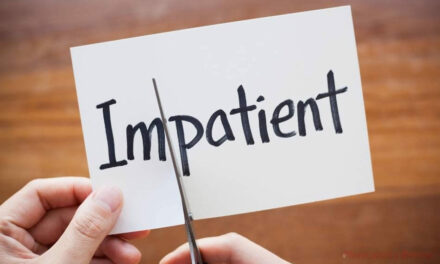Learning to accept daily frustrations
Patience is a virtue! Or, at least that is how the saying goes. But is it really? Patience is “the capacity to accept or tolerate delay, trouble or suffering without getting angry or upset,” with several essential components. Patience is also a skill. We can improve our ability to be patient and engage in practices to become patient.Before looking at how to develop more patience, it is best to define what we are actually talking about. Patience (or the lack thereof — impatience) occurs in response to some sort of difficulty or delay in life that is not going according to expectation. A day can hardly be lived without encountering something that interferes with our plans, and so we might say that the “interferences” or “disruptions” are a normal part of life; to expect otherwise will make it challenging to be patient.
Could it be that one of the strategies for developing the skill of patience is adjusting our expectations so that they are more realistic? We can learn to expect “disruptions.”
We also see that a part of the above definition for patience is “the capacity to accept or tolerate.” Acceptance … what a misunderstood word. Acceptance is often confused with “liked” or “approved,” but acceptance is more of an idea of surrender. Many things occur in life that is undesirable. Our option is to fight against it and to try to change it –– or to surrender and accept it as reality.
Surrender tends to have a negative connotation associated with it, likely from its use in the context of war. Yet, we always surrender to specific realities and don’t think twice. There is much in nature that we surrender to, such as gravity, seasons, daylight, and darkness. We do not view surrendering to those realities as a bad thing. Why? It is because we are sure we cannot change that specific reality, so we choose not to fight it; instead, we accept the reality.
Impatience often comes as a result of not surrendering to a situation that we really cannot fight. Getting stuck in traffic, waiting on someone late for a meeting, or being sidelined by someone else’s mistake are examples of the need to surrender to a reality that we cannot change.
The final component in the definition of patience is accepting or tolerating the situation without getting angry or upset. It helps to separate the feeling of anger from the behavior of anger. We can choose our behaviors, but we cannot choose our emotions. Feelings just happen. When we feel something, we are responsible for managing that feeling and choosing what behavior we will exhibit in response to the feeling. How do you, amid a strong feeling, choose to behave?
The secret is in our thoughts. What we choose to think in response to a feeling can intensify or calm the emotion. What we believe in response to a feeling will allow us to choose our response, or behavior, to that feeling. This mental process is crucial in developing the skill of patience.
While developing the skill of patience is work, becoming a more patient person has many benefits. Believe it or not, patience is well researched. The following are just some of the benefits of being a patient person.
Patience helps you to develop a healthy attitude.[/su_heading] A lack of patience often results in unhappiness and irritability, focusing on the negative and eventually believing that nothing ever seems to go your way. Patience improves your ability to accept setbacks and enjoy life much more. There is a saying; “Good things come to those who wait.” Forbearance allows you to persevere and make more effective decisions, often leading to tremendous success.
Patient people have a greater sense of gratitude.[/su_heading] The skill of patience will help you be less focused on what “isn’t happening” and more focused on being present with life as it is occurring. Similarly, patience enables you to focus on what is good and to be thankful. In fact, patience and gratitude reinforce each other. The more grateful you are for what is good helps you to become more patient, and patience allows you to slow down and notice what is going well.
Patience transforms relationships.[/su_heading] It can help you avoid becoming irritated, defensive, and saying hurtful things. It can slow you down and prevent hasty, selfish decisions. Patience helps in developing the crucial relationship skill of empathy — the ability to understand life from the perspective of another. When you are impatient, you are focused inward on what you are not receiving. On the other hand, when you are patient, you are focused outward, able to think and choose care and compassion for the other person.
Patience is a skill that can be learned and practiced, resulting from choosing to emphasize thinking over feeling. Here are some suggestions for developing the talent of patience (I am glad you were patient enough to wait for them).
Slow Down
Most of us live life at a fast pace, which makes patience difficult. Maybe those who “take some time to smell the roses” are on to something. Very practically, you can pay attention to your breathing. Slow your breathing, breathe deeply, fully expanding your lungs. Taking a few slow “calming breaths” can help you refocus mentally.
Physiologically, deep breathing, relaxation, and exercise dissipate adrenaline (the stress chemical) and release endorphins (the calming chemical). Progressive Muscle Relaxation is a proven stress reliever. It is a 20-minute exercise where a person progressively relaxes all body areas while breathing slowly and deeply. Scripts for muscle relaxation are readily available on the Internet.
Creating a little time for these stress management techniques will reduce stress and pay dividends in calmness and patience.
One last aspect of slowing down is to take a “time-out” when you encounter difficulty. A time-out is a “pause in the action” to step back, look at the situation more objectively, plan a strategy, and ask for help. Once you exercise a time-out, you can bring your most calm, productive, patient self to the problem.
Think
Using thoughts to manage emotions is key to developing patience. You can begin this process by focusing on the big picture. Ask yourself what is true about you, the others involved or the situation as a whole, and reflect on those truths. Examples include: “I have successfully dealt with adversity before.” “The others involved are doing the best they can and want a successful outcome too.”
Another aspect of thinking is to avoid thinking in dichotomies, as in things are good or bad, right or wrong. Most situations in life are in the gray areas, a combination of positives and negatives, and for most problems or situations in life, there is more than one way to solve it.
Choosing to empathize with others is an essential thinking skill you must choose. Empathy involves asking yourself: “What would I think, feel, want or do if I were in that person’s situation?” It can involve trying to imagine the other’s experience and using that understanding to decide how you relate to him or her. Empathy can often be communicated with statements such as, “I wonder if you are feeling/thinking this,” or, “I imagine that if I were in your shoes, I would probably feel or want this.” Empathy builds connection.
Choose
You can literally choose to be more patient, but it requires a certain type of self-talk. You have to tell yourself, “I’m going to relax,” or “I’m going to adjust my expectations and be patient.”
Self-talk is a critical aspect of thinking because we can choose our thoughts. When we do, it also changes brain chemistry. When we choose to think that we will adjust our expectations and try to be patient, it actually causes our central nervous system to relax and to decrease the release of adrenaline.
It can also be helpful to choose to think about the big picture. Often the difficulties that trigger impatience are more minor things; or are at least only a part of your life. We can focus on one specific problem in life or look at many other promising areas. This will allow us to cultivate an “attitude of gratitude.”
Surrender
There is more in life that we are powerless over than what we actually can control, but what we do control is our own self, our thoughts, and our actions. Stress, worry, and impatience are often the results of trying to manage or control something that we are powerless over.
Saint Augustine once said: “Patience is the companion of wisdom.” It is a wise person who sees the big picture, who recognizes that he is not God and who acknowledges that he is not the most important person in the world. It is also wise to develop the skill of patience as it will garner the respect of others. It will also make life more enjoyable.
Start today in choosing to develop more patience. But be kind to yourself so as not to become impatient in developing the skill of patience.
![]()


























